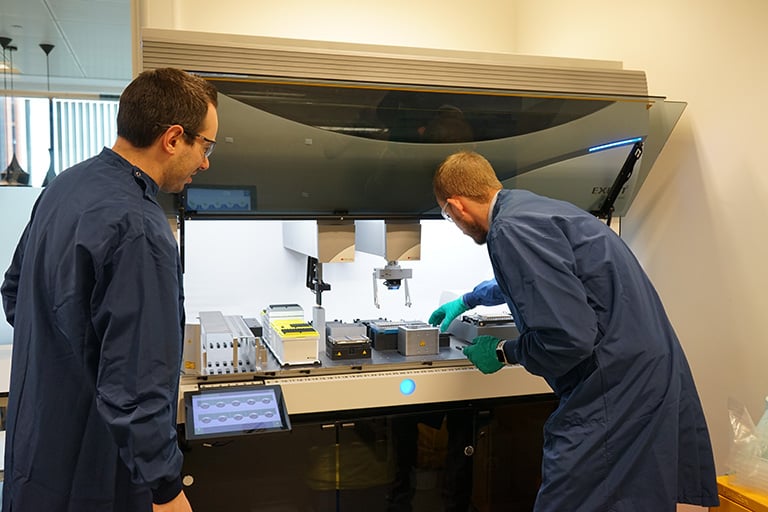Tecan uses cookies to improve our website. By continuing to browse our website, you accept our cookie policy.
Tecan uses cookies to improve our website. By continuing to browse our website, you accept our cookie policy.

Multiple myeloma (MM) remains an incurable blood cancer, but recent advancements in treatment have significantly improved patient prognosis and quality of life. UK-based specialist diagnostic company The Binding Site has developed a new strategy that monitors pre-cancerous conditions associated with MM as well as treatment success, helping to guide therapeutic pathways with more accurate information.
MM has a worldwide incidence of around 160,000 cases per year,1 and is more predominant in the elderly. It is unknown what causes MM, but a condition called monoclonal gammopathy of unknown significance (MGUS) is a common precursor, and requires constant monitoring to ensure early diagnosis if it progresses to malignancy. Traditional methods to diagnose MGUS involve measuring the monoclonal immunoglobulin M-protein through serum protein electrophoresis or immunofixation electrophoresis, which are also used to gauge treatment response in MM patients. These techniques have long been considered the gold standards, however, with the introduction of new therapies, patients are getting a better depth of response, making it harder to monitor treatment success and identify relapses in a timely manner.
 The Binding Site employees prepare samples for analysis
The Binding Site employees prepare samples for analysis
The Binding Site focuses on medical solutions to this kind of challenge – particularly for blood cancers, such as MM, and immune system disorders – and has developed a more accurate method that will help diagnosis and treatment monitoring for these patients. Stephen Harding, Chief Scientific Officer at The Binding Site, explained: “MM patients usually present with a high disease burden, with somewhere in the region of 109 malignant cells in their bone marrow. Electrophoresis gels are sensitive to a concentration of around 107.5, and so can accurately identify these patients on initial presentation. The problem arises after therapy, where the number of malignant cells remaining – termed the minimal residual disease, an important prognostic factor revealing treatment success – is much fewer, making it difficult to quantify cells accurately. Furthermore, antibody-based therapeutics can skew electrophoresis results, as therapeutic monoclonal antibodies (tmAbs) can be wrongly identified as endogenous monoclonal proteins and interpreted as residual disease.”
“We have developed a method using MALDI-TOF mass spectrometry that measures serum M-proteins and has significantly improved the sensitivity of quantification, meaning we can now monitor patients with much lower levels of the protein. However, sample preparation is extremely intricate, involving the extraction of immunoglobulins from patient samples at high volumes, and spotting onto MALDI plates at low volumes. Samples are pipetted from primary tubes and incubated with beads, which are then washed to clear all the serum proteins, ready for spotting. This last step often involves the transfer of liquid down to a single microliter, requiring incredible precision to deliver accurate results.”
Knowing the challenges associated with setting up an automated lab workflow, the company decided to look for an OEM partner to speed up the process, ultimately choosing Tecan Synergence® to help with the project. Stephen continued: “We approached various vendors with these requirements, and decided to partner with Tecan because of the company’s experience with automation. We chose the Fluent® 780 Automation Workstation, and worked closely with Tecan from the beginning to refine and improve our workflow. For example, we needed greater accuracy in some of the pipetting steps – the spotting especially – and a stronger magnet to pull down the beads, as we wanted to wash the samples vigorously. Each time we went to Tecan with specific requirements, the team always managed to find a solution, allowing us to achieve the desired precision and throughput. The entire workflow has been reduced to just two manual steps – loading the primary tubes and transferring the MALDI plates onto the mass spectrometer – making it an incredibly efficient process.”
The Fluent is such a fantastic workhorse, and it really decreases the hands-on time for staff. The biggest differentiator, however, has been the nature of the partnership.
“From there, mass spectroscopy is able to deliver extremely accurate results, with a sensitivity of about 15 milligrams per liter for monoclonal proteins, compared to 1,000 to 3,000 milligrams per liter with gel electrophoresis. It also offers two-dimensional separation, allowing us to see novel features of monoclonal proteins – including post-translational modifications – which can correlate to different disease pathologies. The technology itself is easy to use, and we’re continuously working on intelligent software to remove the subjectivity of analyzing results, making it even more accurate and predictable compared to manually reading electrophoresis gels. This will prove increasingly important as more tmAbs are developed and routinely used, further contaminating the spectra and complicating analysis.”
“The partnership with Tecan has been vital during the development of this method. The Fluent is such a fantastic workhorse, and it really decreases the required hands-on time for staff. The biggest differentiator, however, has been the nature of the partnership. The Tecan team often didn’t have an off-the-shelf solution but, as they understood our goals exactly, they always came up with a tailored approach. Without this support, we truly believe we wouldn’t be launching this product next year, and it also gives us the confidence to continue this collaboration. In the future, we might move to a fully integrated model – including the mass spectrometer – to increase throughput, or continue to refine the method to improve its accuracy even more.”
References
1) Ludwig H, Novis Durie S, et al. Multiple Myeloma Incidence and Mortality Around the Globe; Interrelations Between Health Access and Quality, Economic Resources, and Patient Empowerment. Oncologist. 2020;25(9):e1406-e1413. doi:10.1634/theoncologist.2020-0141
This product is under development and not commercially available. Its future availability cannot be ensured.
To find out more about Tecan Synergence OEM systems engineering services, visit partnering.tecan.com/synergence
To find out more about Tecan’s Fluent, go to www.tecan.com/fluent
For more information about The Binding Site, visit www.bindingsite.com